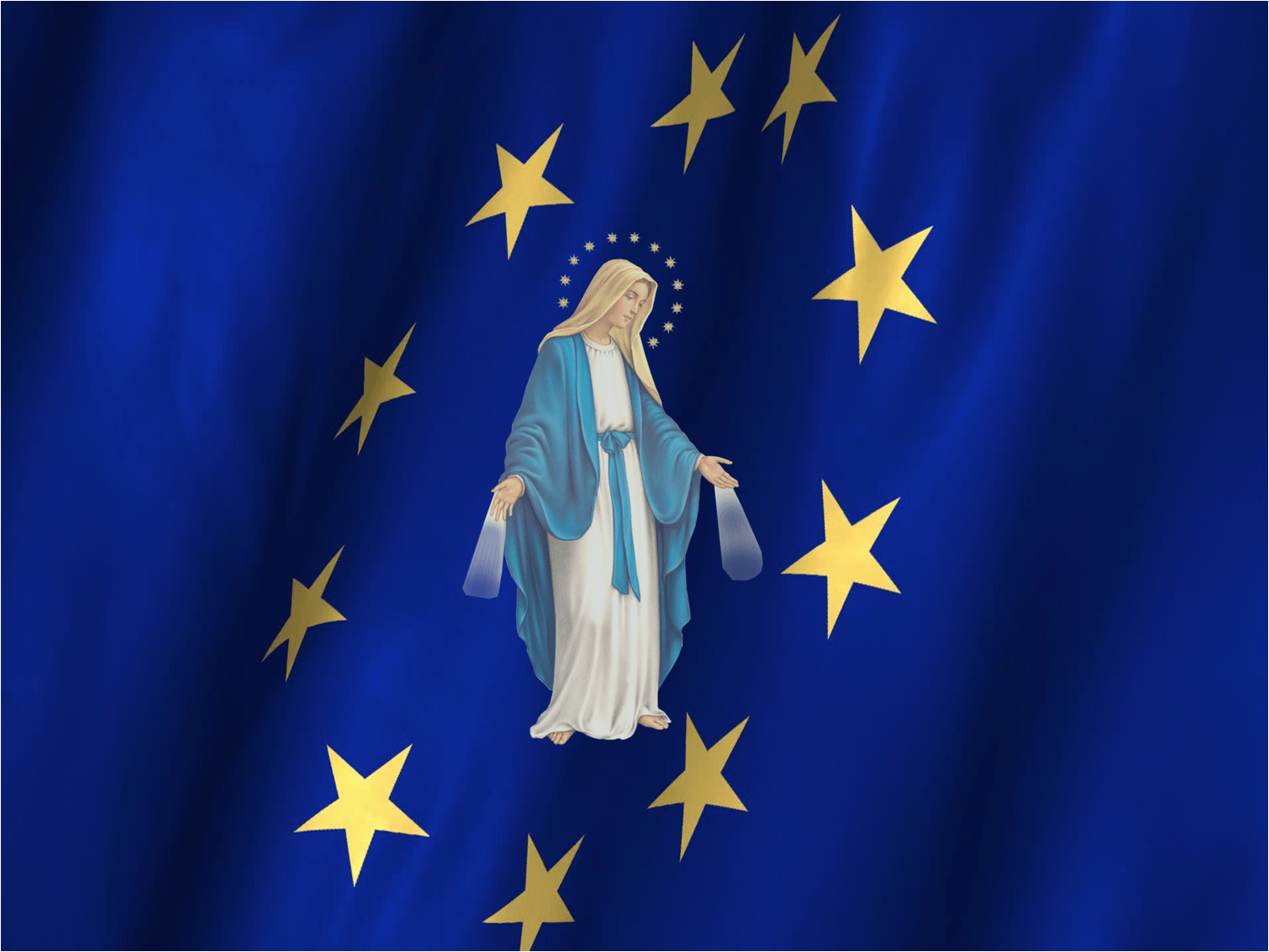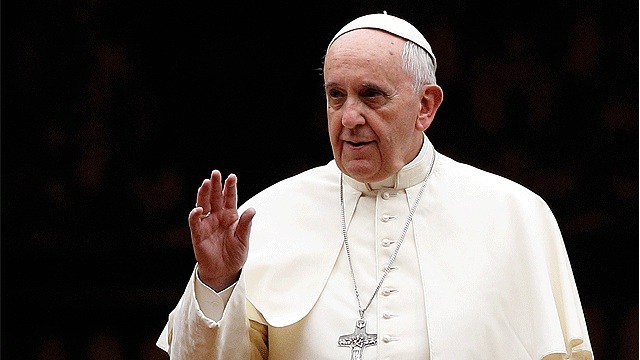
A French court has been slammed by a town Mayor after it ordered the removal of a statue of the Virgin Mary.
The statue is located at a crossroads in La Flotte, a municipality of 2,800 inhabitants on the popular holiday island Ile-de-Re, off France’s Atlantic coast.
The statue was erected by a local family after World War II in gratitude for a father and son having returned from the conflict alive.
Its initial home was a private garden, but the family later donated it to the town which set it up at the crossroads in 1983.
In 2020, it was damaged by a passing car, and the local authorities decided to restore the statue and put it back in the same place, but this time on an elevated platform.
That move triggered a legal complaint by an association dedicated to secularity, on the basis that a French law dating back to 1905 forbids religious monuments in public spaces.
A court in Poitiers followed the argument as did, on appeal, the regional court in Bordeaux, ordering La Flotte to remove the statue, according to a statement.
Local mayor Jean-Paul Heraudeau called the discussion around the statue “ridiculous” because, he said, it was part of the town’s “historical heritage” and should be considered “more of a memorial than a religious statue”.

Studies showing the profoundly positive impact of religion on people’s lives may have underestimated its benefits by not distinguishing those who are more committed from those who are less so.
New research from the Institute of Family Studies shows the full benefits of religion are experienced by those who actively engage in home-centered religious practices, in addition to regularly attending religious services.
For example, individuals with a home prayer life in addition to church attendance are significantly more likely to report high levels of life meaning and happiness in their lives. Specifically, “Home Worshippers” are nearly twice as likely as their less-religious peers, and more than four times more likely than ‘Seculars’ to report a frequent sense of meaning and purpose in their lives.
The researchers also found an increase in reported life happiness with each dosage category of religious involvement. Home Worshipers are significantly more likely to report high levels of happiness than are Attenders, Nominals, or Seculars.
The study also found that women and men across the globe who live the Home Worshiper lifestyle are significantly more likely to report having a highly satisfying and stable marriage relationship than less religious or nonreligious individuals.

A federal judge has ruled that a Catholic hospital in the US state of Maryland ‘discriminated’ against a transgender patient by refusing a request for a hysterectomy as part of a gender transition. Catholic bioethics rule out removing healthy organs or body parts for non-medical reasons.
Officials at St. Joseph Medical Center, which is owned by the University of Maryland, refused to proceed with a hysterectomy scheduled for patient Jesse Hammons, 33, a transgender man.
Hammons, who is biologically female, brought the suit after the hospital said they could not perform the surgery due to guidelines set by the National Catholic Bioethics Center.

Finland’s Covid-era baby boom appears to have been short-lived, according to Statistics Finland.
Unlike in many other countries, the birth rate began to rise in Finland during the coronavirus pandemic. But figures now suggest that Finland’s total fertility rate may have fallen to an all-time low last year—1.33— according to Johanna Lahtela, a senior statistician at the number crunching agency.
Between January and November of last year, 42,500 babies were born, which is some 4,300 fewer births than during the same period in 2021.
In 2010, the country’s fertility rate was 1.87 children per woman but in 2019 the ratio dropped to 1.35. However, a slight but brief uptick, partially attributed to the Covid-19 pandemic, was noted after 2019. Now early figures suggest that last year’s rate dropped to 1.33. The agency will publish final figures for 2022 in April.

Verbal attacks against the Catholic Church in the Dáil are inciting violent incidents targeting churches and parishioners Irish politicians have claimed, adding that the Republic of Ireland is for very many Catholics now “a cold house where they feel they have to hide their faith”.
The comments come in the wake of an arson attack on a church in Kerry and the violent disruption of a Mass at an Augustinian church in Cork.
Leader of Aontú Peadar Tóibín decried the “absolutely shocking” events, saying they don’t happen accidentally.
“There is hardly a day in Leinster House or in the media that there isn’t some kind of verbal attack or casual slur on the Catholic Church,” the Meath West TD told The Irish Catholic.
Michael Collins TD of Cork South-West described the recent attacks as “scandalous”, and that certain politicians in the Dáil are “ranting rather than talking” about the Church.
Clare TD Michael McNamara said there are regular attacks against the Church by TDs “in the name of tolerance”.
“We all need to be careful of our rhetoric. Just because you believe you are right does not make it correct to engage in vociferous condemnation,” Mr McNamara said.

A 290-pupil Catholic primary school is changing ethos to turn multi-denominational as part of the Department of Education’s diversity process and with the approval of the local diocese.
It follows months of discussions within the school community, with the assistance of a department-appointed facilitator.
Following engagement with the school community, it is up to the bishop formally to decide whether or not to go ahead with a proposed transfer and to advise the Department.
The department announced Thursday that the local bishop had notified the department of his intention to transfer patronage of the school under the Schools Reconfiguration for Diversity Process.
Education Minister Norma Foley said she was “delighted that this transfer of patronage will increase diversity of provision in the area and that there will be a multi-denominational primary school option for parents in Athlone.”

Pope Francis has warned again about a coming ‘demographic winter’ in Europe.
Speaking yesterday to the Vatican’s Diplomatic Corps, he stated: “Tragically, we increasingly witness the emergence of a ‘fear’ of life, which translates in many places into a fear of the future and a difficulty in creating families and bringing children into the world. In some contexts, I think for example of Italy, there is a dangerous fall in the birth-rate, a veritable demographic winter, which endangers the very future of society.”
Responding to his comments, Vincenzo Bassi, President of the Federation of Catholic Family Associations. said: “The demographic issue concerns all, and it is appropriate, as well as necessary, to create institutional exchanges at the European and international level with the aim of promoting a new demographic spring”.
He added: “Family policies are a direct competence of every State. But this does not prevent them from taking initiatives by mutual agreement, across political alignments, for the exchange of good practices and for the promotion of family-friendly policies”.

Ireland’s Franciscans have closed two of their oldest friaries in Ireland, each founded in the 13th century. Due to ageing membership and a lack of vocations, friaries at Athlone, Co Westmeath, and Clonmel, Co Tipperary, marked their departures from both towns last Sunday with Masses of thanksgiving.
The move follows an announcement by the Dominicans last September of the closure of their friary on Bridge St in Waterford city, where it has had a presence for 796 years, since 1226.
On September 5th last year Fr Aidan McGrath OFM, described as a “sad and difficult decision for us” to withdraw from Clonmel where there had been a Franciscan friary since 1269.
On October 17th Fr McGrath told friars and staff in Athlone that “regretfully we must now face our present day reality and leave a town where we have enjoyed and valued such support and friendship for close to 800 years.”
As with the friary buildings in Clonmel, he said, “we have not made a final decision on the future of the Athlone Friary and Church at this time, however, we will be exploring various possibilities in this regard in the coming months. When we have reached a decision on the future use of the buildings, I will make a further announcement.”

A majority of Norway’s parliament wants to wait for the results of an investigation before considering a push to create a third legal gender.
The Liberal Party had presented a proposal that would enable people to change their legal gender to something other than male or female.
However, there is a government investigation ongoing into the matter and the Labour Party, the Conservative Party, the Centre Party, the Progress Party, the Christian People’s Party and Patient Focus prefer to wait for its conclusion before making a decision on the issue.
The Christian Democrats are the only party that will say no to a third gender, regardless of the outcome of the investigation.
“I think it is logical to assign gender categories according to biology. We should not undermine the fact that there are people who do not recognise themselves in those categories. Still, we have to find solutions within the current structures”, Christian Democrat leader Hadle Rasmus Bjuland says.
In December 2022, the Swiss government rejected a proposal to introduce a third gender, saying that “the binary gender model is still strongly anchored in Swiss society.”
The government said a national ethics commission found in a 2020 report that the time wasn’t yet right for a change to the system.

The chair of the review into Ireland’s abortion laws has said it is “vitally important” that key research on how conscientious objection rights have operated since the State’s laws were changed is completed before her work is submitted to Government.
Some pro-choice campaigners have called for such rights to be curtailed in case they limit the availability of abortion.
Barrister Marie O’Shea was last year appointed as the independent chair of the review into the State’s abortion laws. Coalition sources said in December that her work was on track to be delivered by the end of 2022.
While “a very substantial amount of work” has been completed, the review is not yet ready as the chair wants to see imminent research on conscientious objection before she submits her much-anticipated report.